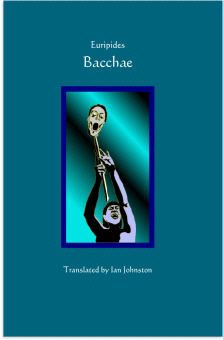Questions? Call us
toll free:
1-800-856-3060
At Richer Resources, we are dedicated to the creation of high quality books, art and other media intended to enrich the lives of individuals of all ages.
As an independent publisher, we are bound by a sense of integrity and quality to produce products which enhance the lives and vision of individuals everywhere.
Sign up to receive notice of free eBooks, new releases and special subscriber-only offers.
(You can unsubscribe at any time)
Classics/Greek Drama ISBN:
978-0-9797571-2-9
USD $8.95
We have made this book available to you for previewing. Clicking on the front cover of the book image to the left will open this book up into a flipbook format which can be read online.
You must have Adobe Flash to open this file. If you do not have Adobe Flash on your computer, you download it free from Adobe here.
Translated by Ian Johnston
Euripides' Bacchae, the last of the surviving Greek tragedies, was not performed during the lifetime of the playwright. Its first production took place a year later (in 405 BC) in the annual competition for tragic drama, where it won first prize. It has remained one of the best-known and most frequently performed Greek tragedies ever since, one of the greatest works of classical Greek culture.
The
Bacchae
holds up a desperate view of human experience,
a vision that led Aristotle to call Euripides "the most tragic of the
poets." Here the royal power in the polis, represented by the young king
of Thebes, Pentheus, is quite incapable of dealing with a political
crisis in an effective way, and the god who has initiated the crisis,
Dionysus, a son of Zeus and a cousin of Pentheus, displays a selfish,
arrogant, and unforgiving malice which leads him to destroy in the most
horrific way the oldest human royal family in Greek legend because he
believes he has been insulted by the citizens of Thebes. Whatever hopes
men entertain for a peaceful harmony between the gods who rule the world
and the human beings who live in it are here exposed as futile and cruel
delusions.
